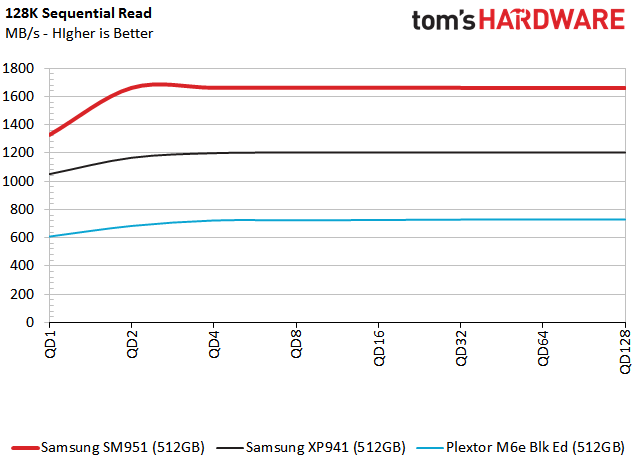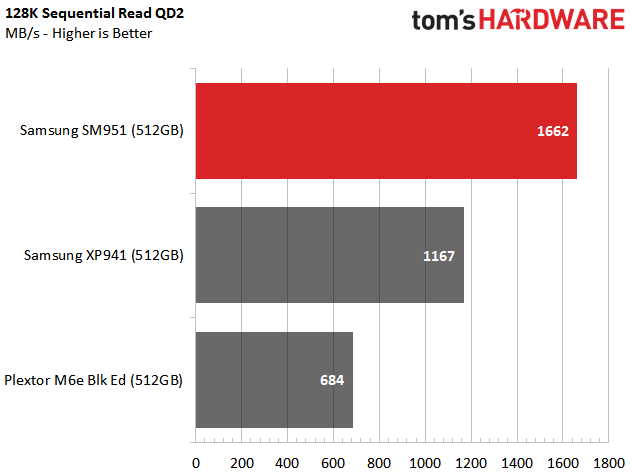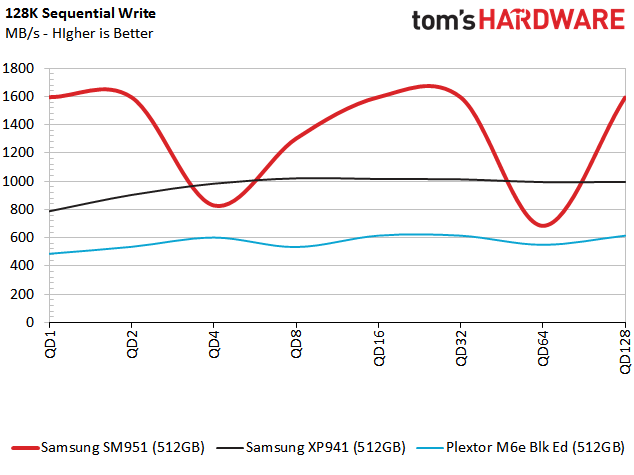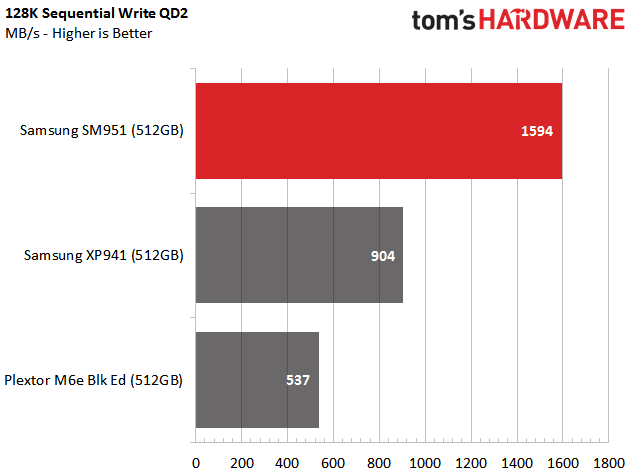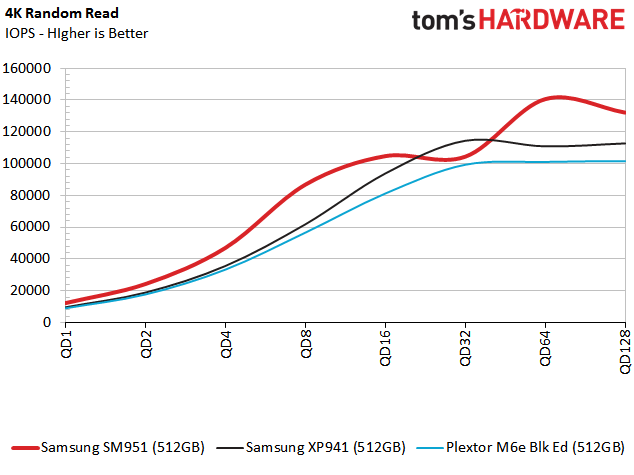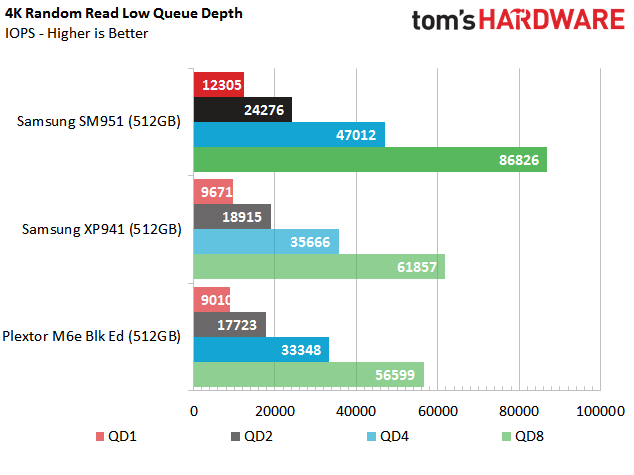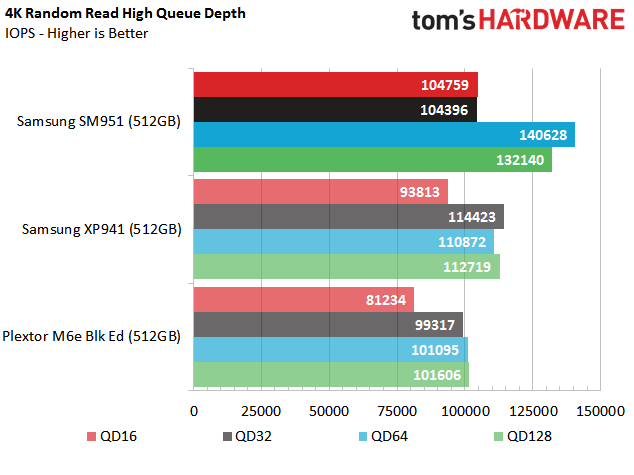Samsung SM951 PCIe M.2 512GB SSD Review
Samsung introduced the SM951 last July during its annual SSD Global Summit in South Korea. Today we're running the drive through our benchmark suite to see if it lives up to the hype.
Why you can trust Tom's Hardware
Four-Corner Performance Testing
Flash-based products pose more testing challenges than mechanical storage products. The workload you run before a test affects the results you see immediately after. In order to make true apples to apples comparisons between products, a strict benchmark regimen must be adhered to. With some products, the type of data used for testing, whether it's compressible or not, changes the performance story.
| Test System | |
| Processor | Intel Core i7-4790K, All Cores at 4.5GHz |
| Motherboard | ASRock Z87 Extreme6 |
| Memory | Corsair Vengeance PC3-19200 (2400MT/s) 2x 8GB |
| System Drive | SanDisk Extreme Pro 240GB |
| Graphics | Intel HD Graphics 4600 |
| Chassis | Rosewill RSV-4412R |
| Power Supply | Corsair 1200i 1200W |
| System Software and Drivers | |
| Operating System | Windows 8.1 Pro |
| DirectX | DirectX 11 |
| Drivers | Intel Rapid Storage Technology 12.9.0.1016Microsoft AHCI |
128KB Sequential Read Performance
There are only two companies with PCIe-based M.2 products on the market today: Samsung and Plextor. In the early charts, we're only showing 512GB SSDs, but later in the story we'll look at a larger group with more capacities.
It's easy to see the performance differences between these three products, and you can expect more of the same through the rest of our review. Samsung's SM951 is easily the fastest consumer SSD on the market. It improves upon the XP941, which was last year's fastest SSD, and it's clearly quicker than Plextor's M6e and M6e Black Edition drives.
Again, Samsung's spec sheet states the SM951 512GB is capable of up to 2150 MB/s sequential reads at a queue depth of 32 using 128KB blocks. We were not able to replicate those claims with modern motherboards using the Z87, Z97 or X99 chipsets from Intel. We did, however, hit 2160 MB/s with a Z68-based motherboard. That's an old platform by today's standards, though, and we're guessing most enthusiasts are running something newer.
128KB Sequential Write Performance
Notice that we took the chart above to a queue depth of 128. Although the SATA spec only allows for queue depths up to 32, PCIe-based products can scale all the way to 256, just like the SCSI command set.
All of the tests on this page involve some degree of preconditioning, since one test acts as the conditioner for the next. To varying degrees, SSDs will demonstrate performance fluctuations based on benchmarking patterns. This is caused by the drive's wear leveling, which cleans up dirty cells and adds latency to writes.
At a more mainstream queue depth of two, the SM951 fares better than we expected based on Samsung's spec sheet.
Get Tom's Hardware's best news and in-depth reviews, straight to your inbox.
4KB Random Read Performance
Random read performance at a queue depth of one is significant to end-user performance. We use a 10,000 IOPS rating as the way to separate great-performing SSDs from the rest of the pack. Samsung's SM951 delivers over 12,000 random read IOPS with a single outstanding command, breaking the record for consumer SSDs.
Most desktop users don't push high queue depths because SSDs finish their work before commands start stacking up. We still run the tests to observe how a drive scales through its queue depth range. The SM951's spec sheet claims the drive is only capable of 90,000 random read IOPS, but in our tests, we achieved more than 140,000.
4KB Random Write Performance
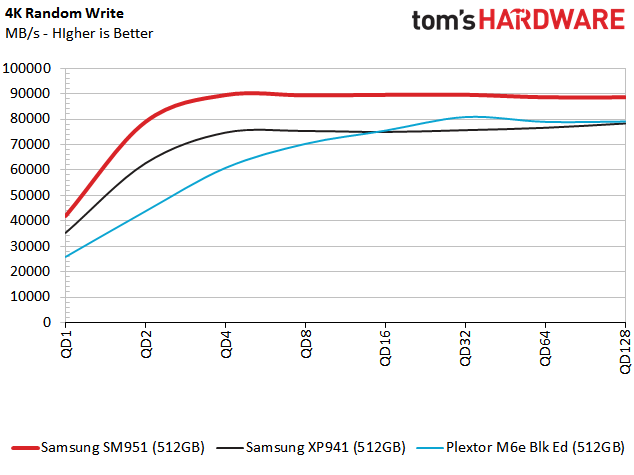
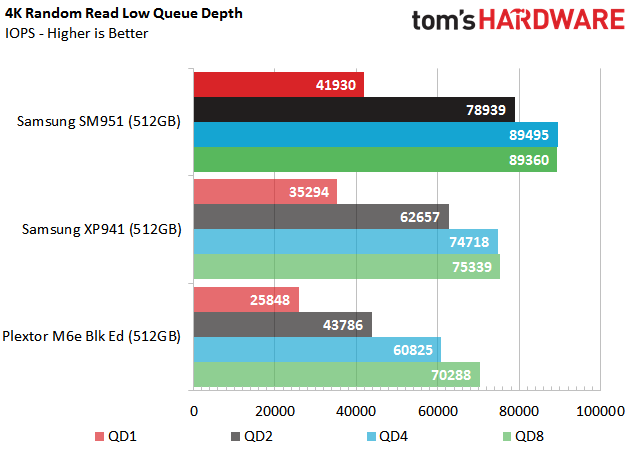
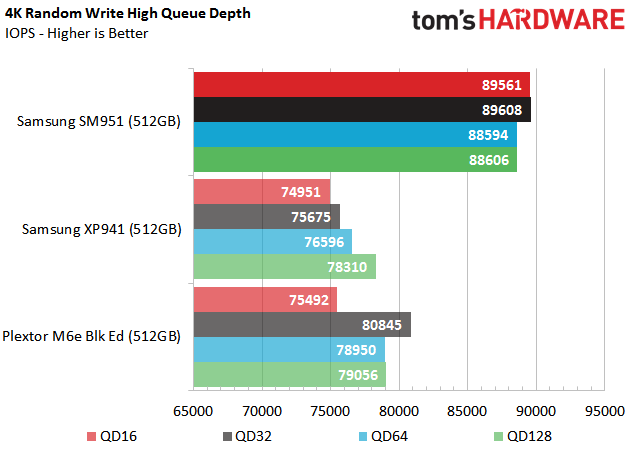
Again, we managed to pull more performance out of the SM951 than Samsung's rates it for. When it comes to writing random data, higher queue depths are easier to achieve through multitasking.
With this last test run, we can see the SM951 is clearly faster than the other PCIe-based M.2 products when it comes to the four corners that make up performance testing.
Current page: Four-Corner Performance Testing
Prev Page A Closer Look at the SM951 Next Page Mixed Workload and Steady State Testing
Chris Ramseyer was a senior contributing editor for Tom's Hardware. He tested and reviewed consumer storage.
-
blackmagnum This is an awesome upgrade for some Macbook Air/Pro users, but just wait until Intel shows their product... and will there be any hardware compatibility issues with DIY upgrades?Reply -
Sakkura I'm disappointed the promised NVMe support did not materialize. But I guess Samsung is saving that for later retail products. Can't argue with the performance though, this is by far the fastest consumer SSD around.Reply -
tom10167 I wish they'd put an 840 or 850 pro in the comparison just to give us a better sense of scale. This drive is incredible, though, and $550 for a 512GB cutting edge drive is not terrible!Reply -
mapesdhs The Power Restricted Performance graph is stupid. Please stopping usingReply
graphs with origins that don't start at zero - the visual graphic impact is
totally meaningless.
Ian.
-
jeffunit You might want to fix the labels of your graphs. Latency in seconds? One chart shows a write speed of about 80 gigabytes per second.Reply -
liquidpower I also wished they put a 850 pro in the charts to see the jump from the fastest sata to the PCIe-based M.2Reply
